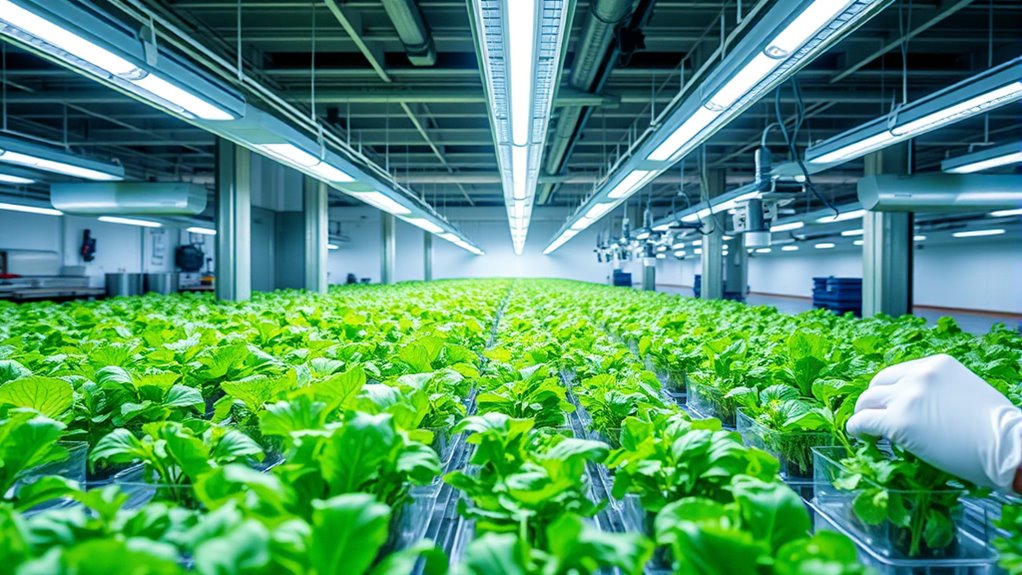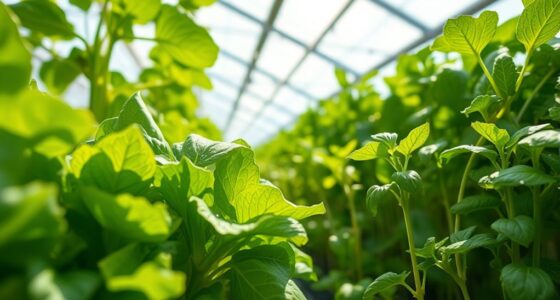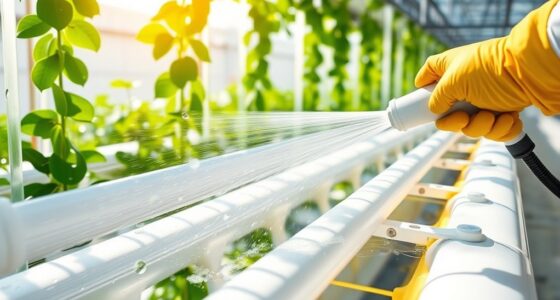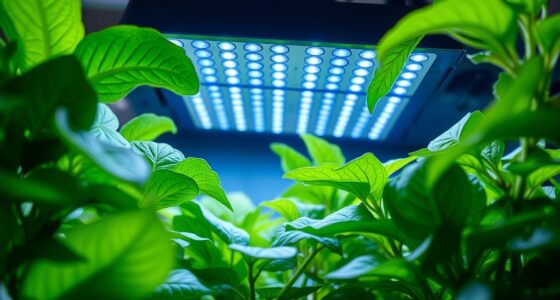To prevent E. coli and Listeria in hydroponics, you should prioritize strict water quality management by regularly testing and using filtered water. Keep all equipment sanitized and maintain a clean environment by controlling humidity and temperature. Monitor your plants closely for signs of disease, and practice good personal hygiene, such as washing hands and wearing gloves. Proper sanitation and environmental controls are key—continue to explore effective strategies for safer, contaminant-free hydroponic cultivation.
Key Takeaways
- Regularly test water sources for E. coli and Listeria to detect contamination early.
- Use filtered, high-quality water and maintain proper pH to prevent bacterial growth.
- Clean and sanitize all equipment, tanks, and tools regularly to eliminate bacteria buildup.
- Control environmental factors like humidity and temperature to inhibit bacterial and mold development.
- Enforce strict personal hygiene and handling practices, including handwashing and protective gear.
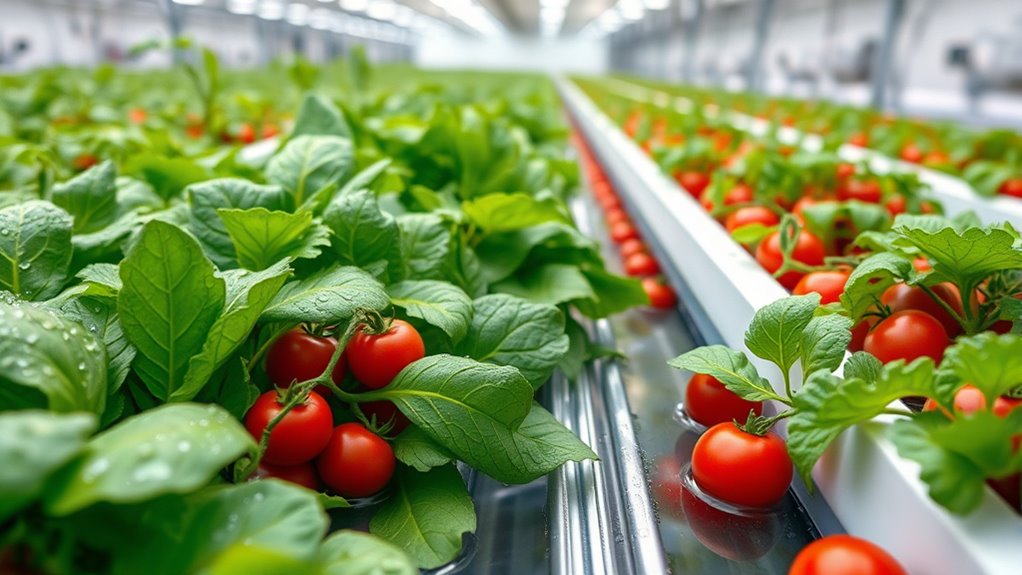
Have you ever wondered whether hydroponically grown foods are safe to eat? It’s a common concern, especially since these methods differ from traditional soil farming. While hydroponic systems offer many advantages, like faster growth and fewer pests, food safety remains a top priority. Bacteria such as E. coli and Listeria can still pose risks if proper precautions aren’t taken, so understanding how to prevent contamination is essential.
In hydroponic setups, water quality is the foundation of food safety. Since plants grow directly in nutrient solutions, any contaminated water can quickly spread bacteria throughout the system. To prevent this, you need to regularly test your water for harmful pathogens and ensure it’s free from contaminants before use. Using high-quality, filtered water reduces the chance of introducing dangerous bacteria into your system. Moreover, maintaining proper pH levels and nutrient balances can discourage bacterial growth, as some pathogens thrive in specific conditions.
Cleaning and sanitizing your equipment is equally vital. All components—including tanks, pumps, tubing, and trays—should be thoroughly cleaned and disinfected on a consistent schedule. Any residue from previous crops or dirty tools can harbor bacteria, which could infect new plants. When handling your system, always wash your hands and use sanitized tools. This simple step minimizes the risk of transferring bacteria from your hands or equipment to your plants.
Controlling environmental factors also plays a role in food safety. Proper ventilation, humidity, and temperature control help prevent mold and bacterial growth. Keep your grow area clean and free of debris, which can serve as breeding grounds for bacteria. Additionally, avoid cross-contamination by designating specific tools and areas for different stages of your growing process.
Monitoring your plants closely is crucial. Regularly inspect for signs of disease or unusual growth patterns. If you notice any issues, remove affected plants immediately to prevent bacteria from spreading. It’s also wise to implement a routine testing protocol for bacteria on your plants and in your water. Quick identification of contamination allows for swift action, such as sanitizing affected areas or adjusting your water treatment methods.
Finally, adopting good personal hygiene practices is fundamental. Always wash your hands before working with your hydroponic system, especially after handling soil, animals, or raw foods. Wearing gloves and protective clothing can further reduce bacterial transfer. Staying vigilant and diligent in these practices helps ensure that your hydroponic produce remains safe to eat and free from harmful bacteria like E. coli and Listeria. Additionally, understanding the importance of proper lighting and environmental control can help optimize plant health and reduce bacterial risks in your system.
Frequently Asked Questions
How Often Should Hydroponic Systems Be Disinfected?
You should disinfect your hydroponic systems at least once a week to prevent bacterial buildup. Regular cleaning removes algae, fungi, and pathogens that can contaminate your crops. After each harvest, give the system a thorough sterilizing, and inspect components regularly for signs of mold or residue. Consistent maintenance ensures your plants stay healthy and safe, reducing the risk of foodborne illnesses like E. coli and Listeria.
Can Contaminated Water Spread Bacteria to All Plants?
Yes, contaminated water can spread bacteria to all your plants quickly. When you use infected water in your hydroponic system, bacteria like E. coli and Listeria can easily travel through the nutrient solution, reaching every plant. To prevent this, you should regularly test and disinfect your water, maintain clean equipment, and monitor for signs of contamination. Acting swiftly helps protect your entire crop from bacterial spread.
Are There Natural Methods to Control E. Coli and Listeria?
Are natural methods effective against E. coli and Listeria? Yes, you can use practices like UV sterilization, beneficial microbes, and proper composting to reduce these bacteria naturally. These methods help create an environment that discourages pathogen growth without chemicals. Have you considered introducing natural antimicrobial agents or maintaining ideal pH levels? By combining these strategies, you enhance your hydroponic system’s safety, protecting your plants and consumers alike.
What Are the Signs of Bacterial Contamination in Hydroponic Produce?
You might notice slimy, discolored, or fuzzy patches on your hydroponic produce, indicating bacterial contamination. Unpleasant odors or a sudden wilting of plants can also signal issues. Leaves may develop dark spots, and roots could appear slimy or foul-smelling. If you observe these signs, it’s essential to act quickly by removing affected plants and inspecting your system to prevent the spread of harmful bacteria like E. coli or Listeria.
How Does Indoor Hydroponic Farming Influence Food Safety?
Indoor hydroponic farming can boost food safety by controlling environmental factors like temperature, humidity, and sanitation, reducing bacterial growth risks. You have the advantage of monitoring water quality closely and preventing contamination. Additionally, since these systems are enclosed, it’s easier to prevent pests and external pollutants. However, you must stay vigilant with regular cleaning and testing to prevent bacteria like E. coli and Listeria from developing.
Conclusion
Think of your hydroponic system as a delicate garden pond. Just as you’d keep the water clean to prevent harmful algae, you must vigilantly prevent E. coli and Listeria from taking root. Regular sanitation, proper handling, and monitoring create a clear, safe stream of fresh produce. When you stay proactive, you’re guiding this vibrant ecosystem to flourish safely, ensuring your harvest remains pure and wholesome—like a pristine pond shimmering in the sunlight.

